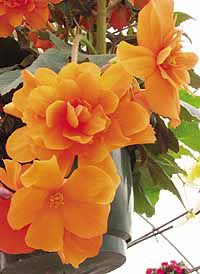Greenhouses mean different things to different people.
To some it is a place they go to get their vegetable plants to put in their garden.
For others, they spend time carefully picking out just the right flowers for their yard.
To others, it is a place of life and beauty; some even just stroll through the glass or plastic enclosures to see the sights.
To the owners of greenhouses, particularly those that sell plants retail and wholesale, it is a business. But one you have to love to stay in. Quick, high profits are not part of the equation.
Many people think because they have built a greenhouse in their yard, and have raised a few plants there, they can go into business and make some fast money.
Quick profits are not known in the greenhouse/nursery industry. Plants and greenhouses need tending 7 days a week, 24 hours a day. Much like having a dairy farm, like cows that need to be milked they do not take any days off. Long hours are required to keep them going.
One does not just build a greenhouse, throw some seeds into a tray and have instantly gorgeous plants. There is a lot of skill required to making everything come out right, just like baking a cake from scratch.
But when it is done right, there is nothing like it. The plants become friends; beautiful friends. And it doesn’t matter if the growing thing is a beautiful rose tree or a plain old tomato plant. They become old friends and when it comes time to sell them, it’s much like selling a dog or a cat that has endeared itself to you.
But unlike a hobby, the nursery business is competitive. The product produced needs to be perfect. Every plant in every tray needs the same consistency in size and quality.
Then there is the problem of pests, which seem to invade at the wrong time; just before big holidays or the start of the growing season.
| Earl Wentzell is the manager of Louise Gardens in Spring Glen. |
Greenhouse operators need to know the plants they stock. Some need more water than others, some more shade. If the knowledge isn’t there to begin with, the education comes hard. The death of plants can be expensive.
Operators need to know the names of the plants they sell; both the common names and the botanical names. And they need to know what is and isn’t supposed to be in a pot.
Regardless of the risks, most don’t do it for the money, although that would be nice. They do it because they love growing things, generally all kinds of things.
Greenhouses in the Carbon-Emery area have a wide variety of plants and flowers. Entering one of these houses of light can be overwhelming. It’s a different world inside, regardless of the weather on the exterior.
It’s easy to tell they love their plants and flowers too.
“It’s been a hard year,” says Charlotte Davis at Cedar Hills Nursery as she pointed at all the flowers still in the greenhouse. “Look how much we still have. Drought years are kind of tough.”
Yet people love their flowers, and some buy them no matter what.
“Business has been good,” said Earl Wentzell at Louise Gardens in Spring Glen. “People have told other people about us and so word of mouth has helped us.” Wentzell’s stock can be seen from Highway 6; a busy location and flowers mix well.
Another greenhouse has opened in Carbonville. However, The Plant Patch is not really new, but was formerly known as Spring Glen Gardens, on the mail loop in Spring Glen.
“We still germinate all our plants at our greenhouse in Spring Glen,” said Josh Boman, son-in-law of the owner who works at the Carbonville Road location. “Then we bring them down here for people to buy.”
Gordon’s Nursery in Huntington also has a good selection, even though the staff there says their best flowers are in the greenhouse in May.
In the climate that exists in eastern Utah the greenhouse business is pretty much seasonal in terms of retail sales. That means that while most businesses can make money all year long, even though some times are slow, greenhouses only have a few months to make their profits. It takes special people to own and operate these hallowed places where plants are grown.
It’s obvious; the beauty of this business is not only in one kind of green.

